I am having a lot of troubles to catch an exception in a async DelegateCommand (Prism 5).
In constructor of the ViewModel:
cmdModificarPedido = New DelegateCommand(Of Object)(AddressOf OnModificarPedido, AddressOf CanModificarPedido)
In the ViewModel:
Private _cmdModificarPedido As DelegateCommand(Of Object)
Public Property cmdModificarPedido As DelegateCommand(Of Object)
Get
Return _cmdModificarPedido
End Get
Private Set(value As DelegateCommand(Of Object))
SetProperty(_cmdModificarPedido, value)
End Set
End Property
Private Function CanModificarPedido(arg As Object) As Boolean
Return True
End Function
Private Async Sub OnModificarPedido(arg As Object)
Try
Await Task.Run(Sub()
Throw New Exception("My Exception")
End Sub)
NotificationRequest.Raise(New Notification() With {
.Title = "OK",
.Content = "Command OK"
})
Catch ex As Exception
NotificationRequest.Raise(New Notification() With {
.Title = "Error",
.Content = ex.Message
})
End Try
End Sub
Why the Exception is not being catched? I know it is another thread, but it is supposed to be catched anyway by the external Try...Catch block (Try Catch outside of: await Task.Run(()).
Note: it is vb.net code, but a C# solution will be fine too.
UPDATE 2 Once I know there was a problem with my debugger configuration (first chance exceptions), I write a more realistic example with same problem:
Private Async Sub OnModificarPedido(arg As Object)
Try
Await Task.Run(Sub()
Try
throwMyException()
Catch ex As Exception
Throw New Exception(ex.Message)
End Try
End Sub)
NotificationRequest.Raise(New Notification() With {
.Title = "Pedido Modificado",
.Content = "Pedido " + pedido.numero.ToString + " modificado correctamente"
})
Catch ex As Exception
NotificationRequest.Raise(New Notification() With {
.Title = "Error",
.Content = ex.Message
})
End Try
End Sub
Public Async Sub throwMyException()
Throw New Exception("My Exception")
End Sub
And now it does not catch the exception when I press F5. It breaks in "throwMyException()", it does not catch the exception although it is called inside a Try Catch block.
Important: If I remove the Async word in "throwMyException", it does catch it!!!
What am I doing wrong now?
Thank you
